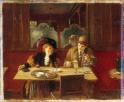A terrible word, -splaining — and a not terribly nice thing
[ by Charles Cameron — Rebecca Solnit and Donald Hall DoubleQuoted, with a touch of Mallory Ortberg ]
.
 Jean Beraud, Scène de café, from Women Listening To Men In Western Art
Jean Beraud, Scène de café, from Women Listening To Men In Western Art
**
I’d have called this piece Youngsplaining if it wasn’t such a terrible word. App-ocalypse, ape-ocalypse, and Apple-ocalypse all arose in response to my Google inquiry about -ocalypses, and I have to say it gets tiresome, especially for a student of apocalyptic — and much the same would be true of -splaining, so I won’t call it that, I’ll just let you know there’s a parallelism.
It was Rebecca Solnit‘s essay Men Explain Things to Me that first hovered around the notion that was later named Mansplaining — a word I can tolderate — and the instance which captured the idea naked was one in which a man, all unknowing, tried to explain to Solnit the importance of one of her own books. It is by now a well-known anecdote, so if you already know it, you can skip it. It’s it’s twin that I want to get to.
But in case you’ve not read it before:We were preparing to leave, when our host said, “No, stay a little longer so I can talk to you.” He was an imposing man who’d made a lot of money.
He kept us waiting while the other guests drifted out into the summer night, and then sat us down at his authentically grainy wood table and said to me, “So? I hear you’ve written a couple of books.”
I replied, “Several, actually.”
He said, in the way you encourage your friend’s seven-year-old to describe flute practice, “And what are they about?”
They were actually about quite a few different things, the six or seven out by then, but I began to speak only of the most recent on that summer day in 2003, River of Shadows: Eadweard Muybridge and the Technological Wild West, my book on the annihilation of time and space and the industrialization of everyday life.
He cut me off soon after I mentioned Muybridge. “And have you heard about the very important Muybridge book that came out this year?”
So caught up was I in my assigned role as ingénue that I was perfectly willing to entertain the possibility that another book on the same subject had come out simultaneously and I’d somehow missed it. He was already telling me about the very important book–with that smug look I know so well in a man holding forth, eyes fixed on the fuzzy far horizon of his own authority.
Here, let me just say that my life is well-sprinkled with lovely men, with a long succession of editors who have, since I was young, listened and encouraged and published me, with my infinitely generous younger brother, with splendid friends of whom it could be said–like the Clerk in The Canterbury Tales I still remember from Mr. Pelen’s class on Chaucer–“gladly would he learn and gladly teach.” Still, there are these other men, too. So, Mr. Very Important was going on smugly about this book I should have known when Sallie interrupted him to say, “That’s her book.” Or tried to interrupt him anyway.
But he just continued on his way. She had to say, “That’s her book” three or four times before he finally took it in. And then, as if in a nineteenth-century novel, he went ashen. That I was indeed the author of the very important book it turned out he hadn’t read, just read about in the New York Times Book Review a few months earlier, so confused the neat categories into which his world was sorted that he was stunned speechless–for a moment, before he began holding forth again. Being women, we were politely out of earshot before we started laughing, and we’ve never really stopped.
**
Okay, here’s the DoubleQuote part: the poet Donald Hall has another essay,Out the Window, in which he recounts a deligiously parallel experience:
Page 1 of 2 | Next page